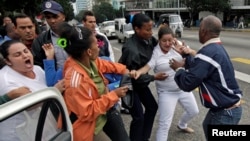Cuban police detained peaceful demonstrators at a busy Havana square on Wednesday, shoving dissidents into squad cars in front of onlookers on International Human Rights Day.
Police snatched demonstrators intermittently as they arrived individually or in small groups over some 90 minutes. The skirmishes briefly disrupted traffic outside the popular Coppelia ice cream shop, providing a spectacle for onlookers waiting for the bus or in line at the cinema.
One dissident leader estimated that dozens were detained in similar actions across Cuba. Police declined to comment.
Officers grabbed demonstrators who chanted “Freedom!” and “Long live human rights!” or held up their index finger and thumb to form an “L” for “liberty.”
Pro-government counterdemonstrators chanted “Long live the revolution!” or “Fidel!” for retired former President Fidel Castro, officially referred to as the “historic leader” or “commander in chief” of the 1959 Cuban revolution.
In what has become an annual display on Human Rights Day, the clash between police and protestors took place in plain view of reporters summoned by the dissident group Ladies in White, which is generally tolerated but periodically harassed.
One man tossed fliers into the street as he was detained. Police scooped them up, refusing to provide a copy to Reuters.
Another man quietly told Reuters in English, “Don't worry, this country will be free very soon. These people are very bad, the communists.” He was then grabbed by police and hauled away in a squad car.
Asked what offense he committed, police pointed to the counterdemonstrators and said, “Ask them.”
Cuban officials typically detain dissidents for a few hours or days and release them without charge.
“Certainly there will have been dozens [of detentions] across the country today, mostly in the capital, but it's still too early to say,” said Elizardo Sanchez, leader of the Cuban Commission for Human Rights and National Reconciliation.
Police detained 398 opposition activists in November, raising to 8,410 the number of short-term detentions this year, the commission said.
The numbers include repeat detentions and cannot be independently confirmed.
Cuba considers dissidents paid agents of the United States and says its free healthcare and education are also human rights.
To support that assertion, the government invited reporters to a Havana hospital treating 279 patients with disabilities.
“Here we work to achieve happiness for those with a mental disability out of the respect our society has for human rights,” hospital director Emelia Ycart said.






